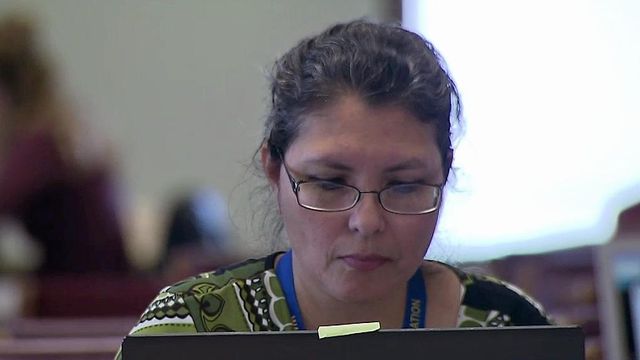Wake Tech works to improve success gap between seated, online classes
Online college courses offer convenience and flexibility, but they also come with challenges. Wake Technical Community College looked at some of its most popular classes in 2015 and noticed students were not doing as well in the online classes as they were in the traditional "seated" classes.
Posted — UpdatedIn 2015, 67 percent of students in traditional classes earned an "A", "B" or "C" grade, while only 58 percent of students in online classes earned the same grades.
One of the things we found out is students, even young students, who had grown up as digital natives aren't as well prepared for taking online classes as you may think," said Wake Tech Senior Vice President of Effectiveness and Innovation Bryan Ryan.
Wake Tech wanted to find a way to get its students better preparation for online courses, so the school developed an orientation program for its students called EPIC (eLearning Preparedness Initiative across the College). It is required for any student who wants to take an online course at the school.
"It helps a lot," said Wake Tech student Ivette Acosta. "When you are here for the first time, you don't know what is the website, what is the blackboard. It guides you through everything."
EPIC also teaches the student about time management when taking an online class.
"Time management is huge. With online classes, it really falls on the student to be responsible and be on top of all of those assignments," said student Luis Oliva.
"One of the reasons students were not successful in online classes initially is it's hard to keep pace," said Rebecca Berry, associate professor of history. "Creating learning objectives has helped. Creating task lists so they know exactly what they should be doing and how long that should take (should help)."
Berry is one of the teachers that has helped develop "EPIC 30," which educates instructors about how to teach online. Like the student program, EPIC 30 is a requirement for instructors who plan to teach online at Wake Tech.
"We teach faculty how to communicate with students in an engaging way," she said.
Wake Tech is one of the only institutions in the country to require training of its students and instructors before they participate in online courses, and the program is showing positive results. The success gap between traditional and online classes started at 9 percent. It is now at 4 percent.
"You may use computers for a variety of different things, including social networking, but attaching a document and sending it to your faculty member or using the learning management system and all of the intricacies of that may require a little more orientation," Ryan said.
Wake Tech is hoping its approach is adopted by more colleges and universities around the country. EPIC 30 is available to any teacher, at any school, who wants to learn more about how to teach a better class online.
It has seen enrollment from five states, including Texas and Michigan. The program has attracted high school teachers, professors and even a current college president.
• Credits
Copyright 2024 by Capitol Broadcasting Company. All rights reserved. This material may not be published, broadcast, rewritten or redistributed.





